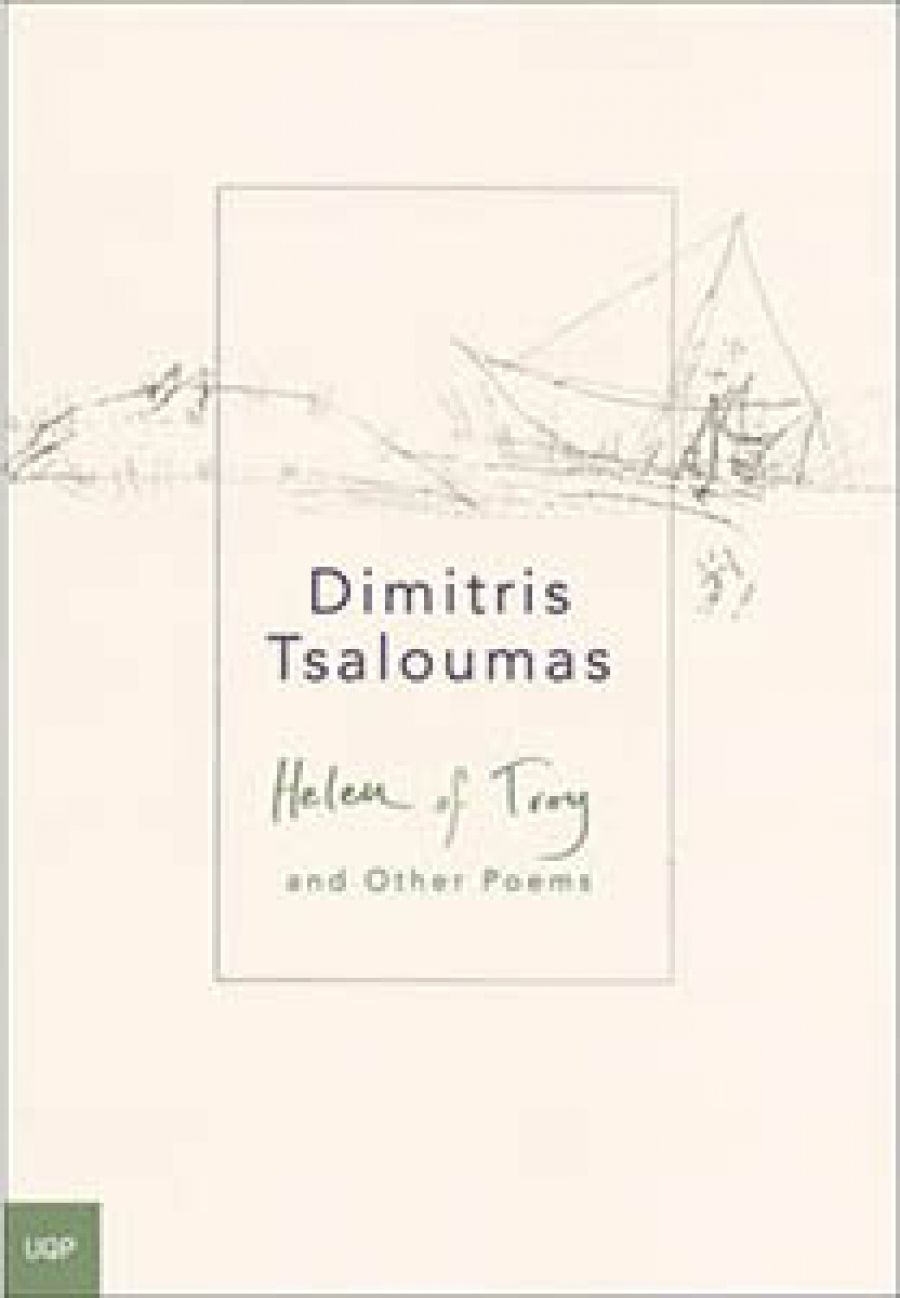
- Free Article: No
- Contents Category: Poetry
- Review Article: Yes
- Article Title: Gryphons and mobsters
- Online Only: No
- Custom Highlight Text:
Dimitris Tsaloumas is often thought of as a poet writing between two languages. In his English poetry, this emerges in the way that the everyday diction of Greek often functions as the learned register of English. ‘Nostalgia’, as a compound word, is a modern Western coining, but when Tsaloumas opens the volume with ‘Nostalgia: A Diptych’, he evokes the Greek components of the word, particularly nostos with its connotation of Homeric return.
- Book 1 Title: Helen of Troy and Other Poems
- Book 1 Biblio: UQP, $23.95 pb, 99 pp
Helen of Troy and Other Poems is divided into three parts, an unnamed section (containing, among many others, the title poem and the crucial sequence ‘Winter Journey’), a middle part, ‘A Divertissement’, followed by ‘Towards a Conclusion’. This suggests an alteration of ‘serious’ and ‘lighter’ poems, and indeed the volume contains this, though not necessarily in the sections as delineated. Many of the poems in ‘A Divertissement’ concern reductionism, whether modern (‘Filling in the Entry Form’) or pre-modern (‘The English Hunchback King’). Tsaloumas is both dismayed and wryly amused by attempts to regiment life. Retelling the story of Daphne, Apollo’s love, being turned into laurel, he takes the story of the woman-turned-plant one step further, as she becomes ‘a tree of shiny leaves / which crown poets since and heroes, / and flavour our pilaff or lentil soup / on days of fast, and our rabbit stews’.
Daphne is only one of many women who appear in the book. Helen of Troy, though not a book of love poems per se, is very much a book about a male poet imagining a variety of women. Tsaloumas also takes the ‘one step further’ device he used with Daphne in respect to the volume’s title character. He notes that Helen not only, as a person, caused great struggles, but, as trope, caused the poet to ‘summon kings / and muster heroes’ so that ‘beauty might be remembered’. Elsewhere, women are turned into marble, enclosed in weed-filled gardens, personified as Hope lingering by the gate. Women live as nymphs, as mortal beauties, as ancient crones dramatically entering the theatre at the last minute. Definitely the male gaze; but a more kaleidoscopic gaze than most. Eurydice, though, is the epitome of all the wistful female presences that the male poet seeks to conjure:
Eurydice Eurydice
Not even love my love
nor life-restoring melody
could lure you all the way
from the far land of the dead
Other shapes the poet summons are less comely. In ‘Gryphon’, Tsaloumas depicts the mythical beast’s ‘monstrous beauty’, which, for all its ferocity, was ‘in the pattern / of a provident world’, not subject to modern ideological manipulation. Just before I read this book, I saw an exhibition of objects from the Sassanid Empire at the Asia Society in New York. Tsaloumas’s poem aptly captures the combination of brutal mastery and uncanny innocence of the many gryphons seen in the Persian images.
Just when one thinks Tsaloumas is dedicated to composing a poésie pure out of traversing the border between transcendence and incarnation, sprightly, mordant poems such as ‘Mob Boss Ponders Executions’ appear.
The lyricism, the grave delight in life, and the sense of ultimate concern prompt comparisons to Yeats, while the combination of incantation and riddle at times suggest Montale. Tsaloumas is different from either: drier, more buoyant, seemingly lacking any especial personal or political agenda. Indeed, when Tsaloumas is obscure, it seems to come from decorum as much as from any sense of occult agenda. ‘Winter Journey’, though its imagery of ravening wolves is blunt and visceral, is rather gnomic. But what seems the sequence’s terminal credo, in its penultimate poem – ‘The wolves won’t have the dead / The spring will fail for ever’ – is lapidary in noting the exact balance between deliverance and loss. Cyclical alteration, the evil failing along with the good, is the most we can count on.
The landscape in this sequence seems neither Greek nor Australian. The background recurring throughout the volume is a dry, vast steppe, with an Australian expanse but a Eurasian sense of history and fear. Tsaloumas avoids writing about ‘migrant’ concerns, or too-literal renderings of the countries he knows well. But there is a demotic elegance to his poetic persona. In contrast to the imperial pedigree of Manoly Lascaris, the other Greek-Australian roughly of Tsaloumas’s generation to be prominent in Australian literature (albeit through the work of another), Tsaloumas is an everyday observer. He makes us claim and feel his metaphysical aspects as our own.
Tsaloumas’s unusual accomplishments in two languages deserve the acclaim they have attracted. Above all, he is simply a brilliant poet, and this volume is perhaps his most valuable yet.


Comments powered by CComment